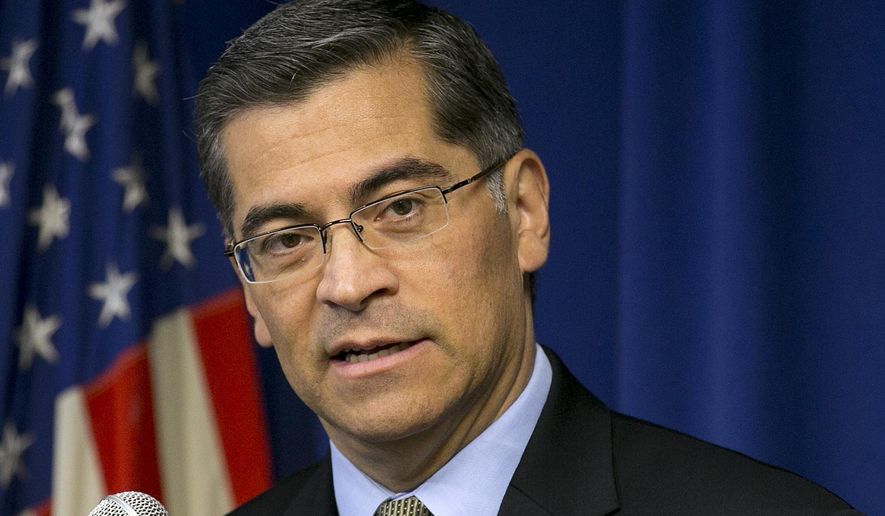Congress may have cut the Obamacare penalty to zero, but that doesn’t mean the individual mandate requiring Americans to have insurance is actually gone, Democratic state officials explained Thursday.
They’re preparing to argue in a major courtroom showdown next week that the 2010 health law is still legal even without the punishing taxes that were originally the heart of the law’s constitutional basis, according to the Supreme Court.
California Attorney General Xavier Becerra compared the tax penalty to a bank account — even if all the money were removed, the account would still be there, he said.
“You could replenish that checking account the next day,” he told reporters Thursday.
Congress in last year’s tax cut law did cut the Obamacare penalty to $0 beginning in 2019, freeing Americans from consequences for refusing to have insurance coverage.
Texas and other GOP-led states say that Chief Justice John G. Roberts Jr. in 2012 upheld the health law as an exercise of Congress’s taxing power, so without it the whole program should fall.
But Democratic state lawyers say the tax is still on the books, even if it doesn’t actually hit anyone’s wallet.
“A tax doesn’t have to generate revenue in order to be a tax,” North Carolina Attorney General Josh Stein said in a conference call hosted by Protect Our Care, a pro-Obamacare group.
They’ll take their argument Wednesday to U.S. District Court Judge Reed C. O’Connor — an appointee of President George W. Bush. And they’ll argue without backing of the federal Justice Department, which is refusing to defend the Affordable Care Act against Texas’s challenge.
“The federal government went AWOL,” Mr. Becerra said.
The lawsuit in question was filed by 20 red states in February. They say Obamacare is pricing too many of their constituents out of the individual insurance market, and they’re tired of waiting on Congress to replace it with something else.
They say that without the tax, the rest of Obamacare’s complex rules, subsidies and marketplaces cannot legally stand.
Some experts say the case isn’t likely to get far, yet it’s spilling into the fight over Mr. Trump’s pick for the Supreme Court — Judge Brett M. Kavanaugh — and mid-term election debate, since if Texas wins it could mean popular parts of the 2010 law, such as mandatory coverage for people with pre-existing conditions, would disappear.
Mr. Stein called the showdown a “literally a life-or-death issue” for thousands of people with pre-existing conditions in his state.
Timothy S. Jost, a law professor at Washington and Lee University who tracks the debate, said he finds the Democrats’ argument persuasive — other Obamacare levies have been delayed and aren’t collecting anything, yet are considered taxes on the books, and the IRS can collect past penalty sums from future tax refunds.
Democratic attorneys general say if the court decides that Congress is no longer taxing people under the mandate, it shouldn’t strike other parts of Obamacare.
“When Congress amended the law in 2017 to zero out the tax, no one in Congress thought they were repealing any other part of the ACA,” Mr. Jost said.
Democrats are hoping the courts deliver a political win, too, by pinning blame for Obamacare’s upheaval on the GOP tax bill.
State GOP plaintiffs say their lawsuit isn’t about punishing customers but about wiping the slate clean and prodding Congress to approve a new, market-oriented system that’s more affordable than Obamacare.
GOP attempts to do that ran out of gas in 2017.
Two of the attorney general plaintiffs — West Virginia’s Patrick Morrisey and Missouri’s Josh Hawley — are running for Senate seats held by Democrats this fall. They said they’d vote in favor of pushing an Obamacare replacement across the finish line.
Ten Senate Republicans are skittish about their lawsuit, however, and filed a bill that would enshrine Obamacare’s protections for sicker Americans in a health-privacy law from the 1990s. They want to stave off political finger-pointing and blowback from constituents with pre-existing conditions, if the courts gut the Democrats’ program.
• Tom Howell Jr. can be reached at thowell@washingtontimes.com.




Please read our comment policy before commenting.